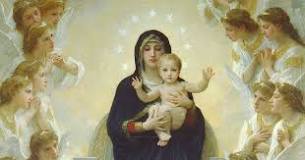By Valentine Obienyem
At first glance, one might wonder how this theological question addresses the pressing issues in Nigeria. Yesterday, I listened to Fr. George Ehusani, whose practical and liberating theology aims to awaken the conscience of those in power over the minimum wage debate.
Besides engaging in Fr. Ehusani’s type of apostolate—using the pulpit to fight societal ills—ministers of the church should also assist in solving theological questions through clear, thoughtful explanations. I am happy that many priests are using social media to do this. I have listened to some of them on Mary, the Mother of God. This is not a war, but a constructive exercise to dispel doubts, cure ignorance, and help us appreciate the truth.
One point of contention between the Catholic Church and other denominations is the recognition of Mary as the Mother of God. Recently, this theological issue sparked debate between some Catholics and others – a clear reverberation of old heresy.
From their arguments, it was evident that beyond lacking scriptural knowledge, they also lack historical awareness. I have often noted that non-Catholic churches criticize the Catholic Church by reviving heresies that the Church had already condemned long ago. There is no controversy in Christendom that the Church has not previously addressed and resolved, often through councils, which relied on Bible assisted by tradition. The issue of Mary is one such example.
Early Christians, including the apostles and those in direct contact with them, called Mary the Mother of God based on well-interpreted scriptural evidence. Modern-day critics rely on the Bible too, but their interpretations are flawed.
In the early 5th century, the Christian Church faced significant challenges. In North Africa, the Donatist heresy, led by Donatus, Bishop of Carthage, rejected the validity of sacraments administered by sinful priests. One of the decisions of the Council of Carthage was that the moral state of a priest does not affect the validity of the sacrament he administers.
Simultaneously, Pelagius (a monk and theologian) challenged the doctrine of original sin, while Nestorius (a bishop), influenced by Theodore of Mopsuestia, questioned calling Mary “Theotokos” (Mother of God), suggesting instead “Christotokos” (Mother of Christ). This view caused a major controversy. Cyril of Alexandria defended the orthodox position that Mary bore both the divine and human natures of Christ. Pope Celestine I convened a council in Rome, demanding Nestorius retract his views. When he refused, the Council of Ephesus in 431 AD excommunicated and deposed him.
The point I want to make is that by declaring Mary unworthy of the reverence Catholics give her, these modern pastors are not presenting anything new. They are merely resurrecting heresies the Church addressed and resolved through councils centuries ago. The Church’s position remains correct, and nothing would be gained by treating Mary otherwise in light of the scriptures.
Let us here sample some statements from early Christian Fathers on Mary as the Mother of God. These were people, some of whom knew the apostles or those who knew them, and could confidently tell us how the apostles treated Mary, forming the foundations of their orthodoxy.
Early Christian Fathers throughout history have articulated the belief in Mary as the Mother of God. Ignatius of Antioch (c. 35–107 AD), in his “Letter to the Ephesians,” emphasized Jesus Christ’s divine and human nature, stating, “For our God, Jesus Christ, was conceived by Mary in accord with God’s plan.” Similarly, Irenaeus of Lyons (c. 130–202 AD), in “Against Heresies,” highlighted Mary’s obedience and role in the divine plan of salvation, affirming that she received the news of bearing God from an angel.
Athanasius of Alexandria (c. 296–373 AD) strongly defended the divinity of Christ in “On the Incarnation,” affirming Mary as the Theotokos, or Mother of God. He argued that Jesus had to be fully God and fully man for salvation, thereby making Mary the Mother of God. Gregory of Nazianzus (c. 329–390 AD) explicitly used the term Theotokos in his “Letter to Cledonius,” emphasizing the unity of Christ’s divine and human natures.
John Chrysostom (c. 347–407 AD), in his “Homilies on the Gospel of Matthew,” spoke of Mary’s divine motherhood, emphasizing her unique role in the Incarnation. He argued that Mary is truly the Mother of God because she gave birth not only to a man but also to God Himself. Cyril of Alexandria (c. 376–444 AD), in his “Third Letter to Nestorius,” staunchly defended the term Theotokos, declaring that anyone denying Mary as the Mother of God would face the anathema of the church.
Augustine of Hippo (354–430 AD), in “Sermon 186,” affirmed Mary’s divine motherhood by stating that since Jesus is God and Mary is His mother, Mary is indeed the Mother of God.
These early Christian fathers’ writings collectively affirm the theological position that Mary is the Mother of God, highlighting her essential role in the Incarnation and the unity of Christ’s divine and human natures.

